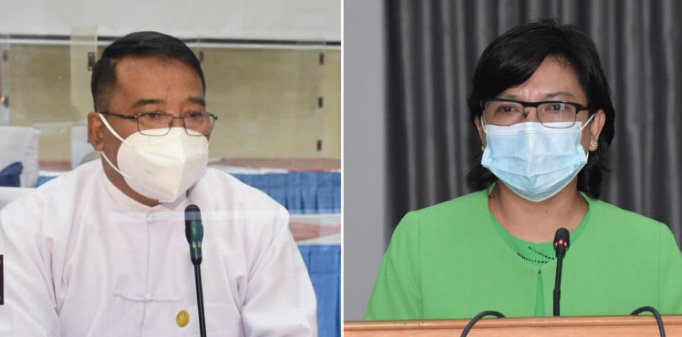IRRAWADDY: Myanmar’s regime has filed corruption charges against two detained medical chiefs, alleging they defied ministerial orders by returning international grants to the United Nations.
National immunization director Dr. Htar Htar Lin and director-general of public health Dr. Soe Oo were charged in Naypyitaw for returning 168 million kyats (US$120,000), which was part of a COVID-19 vaccine grant, to the UN children’s charity, Unicef.
Dr. Htar Htar Lin faces three charges from the junta for incitement, high treason and under the Unlawful Association Act after her arrest on June 10 for taking part in the civil disobedience movement (CDM) by refusing to work under military rule.
The junta-controlled media said on Tuesday that Dr. Htar Htar Lin returned part of the Global Alliance for Vaccines and Immunization’s Health System Strengthening grant from Unicef and the World Health Organization on Feb. 10.
The Ministry of Planning, Finance and Industry on January 26 ordered that the remaining funds (168 million kyats nationally and 840 million kyats regionally) should not be spent. The director’s return of the national grant to Unicef reduced government funds, the junta claimed.
It accused Dr. Soe Oo, who chaired the external aid committee which was overseeing the COVID-19 grant, for failing to stop Dr. Htar Htar Lin. He is charged under Articles 56 and 63 of the Anti-Corruption Law, which targets public figures who commit graft, for aiding corruption.
At least 210 health workers have been detained since the Feb. 1 coup, according to Physicians for Human Rights in October. Its report, Violence Against or Obstruction of Health Care in Myanmar, said 29 health workers were killed and 40 injured since the coup. The junta raided at least 87 hospitals and occupied 56 of them, the report said.
U Tun Kyi, a committee member of the Former Political Prisoners Association, said the junta has previously hidden the news about Dr. Htar Htar Lin.
“The latest charge is ridiculous but it is the way the regime tends to defame political prisoners to keep them behind bars,” the former political prisoner said.
The military council has “too many grudges” against Dr. Htar Htar Lin, who was brave in refusing to work, he said. U Tun Kyi added that the junta thinks striking doctors and deposed political leaders, including State Counselor Daw Aung San Suu Khi, “will lose their dignity if they are charged with these concocted corruption cases”.
In June, the junta charged Dr. Htar Htar Lin and 26 other doctors with high treason and incitement and under the Unlawful Association Act for allegedly assisting the civilian National Unity Government (NUG).
She was accused of being a member of the CDM’s core group and assisting the NUG, which is designated as a terrorist group by the junta.
The CDM was launched by medics on Feb. 3 in protest against the coup and followed by other government staff nationwide.
In early February, Dr. Htar Htar Lin emailed colleagues to say she would probably face accusations that she misused funds as the dictatorship would want to steal from the vaccination program.
The email reportedly said: “We can’t let the military dictators use COVID vaccinations as a weapon. The military council wants to get back $75 million that was paid to the Serum Institute of India for COVID-19 vaccines.”
On Feb. 20 the junta charged Dr. Htar Htar Lin with incitement at Oattara Thiri police station in Naypyitaw.
The junta said she confessed to communicating with Dr. Zaw Wai Soe, the NUG’s health minister, through Signal and Zoom apps.
The state media said she helped write speeches and NUG health policy documents and helped prepare for Zoom meetings and estimated drug requirements and costs.
Dr. Htar Htar Lin faces up to 23 years in prison and Dr. Soe Oo up to 20 years if they are convicted of the corruption charges.
The Unlawful Association Act charge carries up to three years in prison.
Article 505-A of the Penal Code labels criticism of the junta as incitement and carries up to three years in prison.
It was added by the junta in mid-February and has been against the majority of anti-regime protesters and activists.
Articles 56 and 63 of the Anti-Corruption Law carry up to 10 years in prison each.

